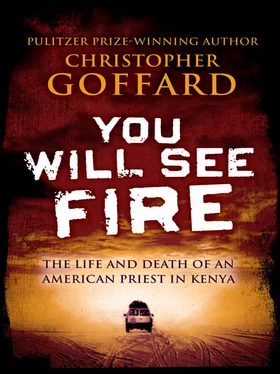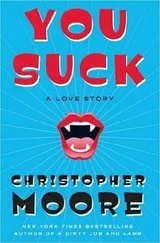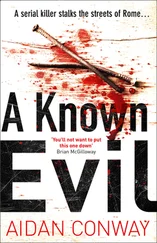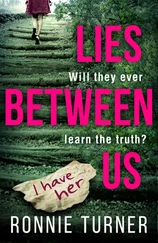This was Sunkuli country. He held the local parliamentary seat. He was not just the area’s political kingpin and its most prominent Masai but also one of the most powerful figures in the country. He had grown up on the grass plains, tending his family’s goat herds. He had been an altar boy and a Christian youth leader, and remained a conspicuous member and benefactor of the Catholic Church. He had been plucked from the margins of power by His Excellency the President of Kenya, Daniel arap Moi, East Africa’s longest-reigning gangster-statesman, who had given him a place in his inner circle. As minister of state in charge of internal security, Sunkuli commanded a vast police network, and was widely rumored as a possible successor to the president. When he smiled, the gap in his lower jaw showed where his teeth had been chiseled out, evidence of his childhood initiation as a Masai warrior. Sunkuli was different from some of Moi’s other top men, with their charm and European degrees. Sunkuli emitted a raw street fighter’s intelligence, a backcountry roughness that had persisted through his years as a lawyer, magistrate, and political boss.
To Kaiser, Sunkuli seemed the crystallized embodiment of Moiism, the perfect product of a culture of Big Man impunity—widely feared, apparently untouchable by the law or the electorate. For years, the priest had received reports that Sunkuli had been preying on schoolgirls; some said the countryside was dotted with his unacknowledged children. Kaiser had helped push a legal case, now working its way through the courts, in which a young Masai girl from his parish had accused Sunkuli of rape; it had made headlines. The priest described him as his “biggest worry.” Конец ознакомительного фрагмента. Текст предоставлен ООО «ЛитРес». Прочитайте эту книгу целиком, купив полную легальную версию на ЛитРес. Безопасно оплатить книгу можно банковской картой Visa, MasterCard, Maestro, со счета мобильного телефона, с платежного терминала, в салоне МТС или Связной, через PayPal, WebMoney, Яндекс.Деньги, QIWI Кошелек, бонусными картами или другим удобным Вам способом.
It will be one or the other of us, he told people. There was no way to know how many spies he might have. Some people said that one of them was living in the priest’s own house.
Kaiser would pass on, into the countryside. His truck had a whimsical name, “the Helicopter,” because it frequently left the roads, heaving and lurching over terrain that brought anguish to his neck. Throughout the day, he would venture deep into the grasslands, through drenching rains and sucking mud and hard sunlight, to reach the scattered outstations of his vast parish. He had traversed this mapless landscape so many times that the topography itself supplied his signposts: a fig tree, a ridge of rock, a gulley. Certain arcane knowledge accrued to a man over a lifetime in the bush. He had learned to start his truck with a coin when he lost the key, and he understood the utility of a bar of brown soap to patch cracks in a leaking gasket. He had learned to deflate the tires to surmount a bad hill, and to sit on a crate when the front seat fell apart.
A fiercely doctrinaire Catholic who espoused obedience to the letter of Vatican law, he was nevertheless adept at bush-missionary improvisation. He found that a Coke bottle was a serviceable receptacle Конец ознакомительного фрагмента. Текст предоставлен ООО «ЛитРес». Прочитайте эту книгу целиком, купив полную легальную версию на ЛитРес. Безопасно оплатить книгу можно банковской картой Visa, MasterCard, Maestro, со счета мобильного телефона, с платежного терминала, в салоне МТС или Связной, через PayPal, WebMoney, Яндекс.Деньги, QIWI Кошелек, бонусными картами или другим удобным Вам способом.
for holy water. When he’d traveled hours, only to discover he had forgotten the Communion wafers, he looked for the nearest kiosk that sold chapati—a doughy flat bread resembling a pancake—to transform into the Savior’s body. A crack shot, he’d been vanishing for years into the elephant grass with his shotgun, stalking wildebeests and impalas, warthogs and zebras and buffalo. He would skin the carcasses—sometimes yanking the skin free with ropes attached to his truck—and carve up the meat and distribute it among the parish schools. He whittled the stocks of his guns and made his own bullets, shaving lead from an old battery and pounding the pieces into slugs. He shook in half rounds to conserve gunpowder and to mute the noise when he hunted, in case a game warden was within ear-shot. Poaching had been outlawed since the late 1970s, but that was one of man’s laws and therefore negotiable.
Some regarded him as an unbreakable man, the “John Wayne of priests.” They saw the six-foot-two former U.S. Army paratrooper who could creep close enough to a buffalo to kill it with a single half-powder round through the lungs or heart (to take a second shot gave wardens a bead on your location). They saw the hunter who refused to leave a wounded animal behind, despite the danger of pursuing an enraged, bleeding beast into the bush. He had promoted a fierce image, in part, as a form of protection. Even before he was an enemy of the state, he recognized the shotgun’s value in deterring ordinary trouble. He hauled it outside now and then to shoot at birds; everyone knew the American priest was armed. He had performed prodigious physical feats well into middle age, hunting, hauling, digging, building. When he arrived in Masailand in his early sixties, he was still strong and fast enough to kill a rabbit with a hurled stone or a dik-dik with an ax, and he’d be on top of the animal before it even fell, hacking with a big overhand arc. He was still popping wheelies on his motorbike for the amusement of the Masai girls.
He’d come through the crucibles of any bush missionary—hepatitis, typhoid, malaria, amoebic dysentery. He’d broken bones in motorcycle spills and survived a roof beam crashing on his neck during a construction project.
But the last few years had been brutal even by his standards; his body had become a catalog of anguish. Though he hated seeing the doctor Конец ознакомительного фрагмента. Текст предоставлен ООО «ЛитРес». Прочитайте эту книгу целиком, купив полную легальную версию на ЛитРес. Безопасно оплатить книгу можно банковской картой Visa, MasterCard, Maestro, со счета мобильного телефона, с платежного терминала, в салоне МТС или Связной, через PayPal, WebMoney, Яндекс.Деньги, QIWI Кошелек, бонусными картами или другим удобным Вам способом.
, he’d gone dozens of times. He’d endured prostate cancer, and multiple bouts of malaria that grew increasingly resistant to quinine and left him helpless, sweating through fevers and convulsions and hiding from harsh sunlight and the gouging of birdsong in the ears, the terrible cold seizing him, his body without bones or muscles or volition for weeks. At times, as the decades accreted in the bones, a man could feel like the sum of all the stumbles off his motorcycle and falls in the mud, a creature of collapsing cartilage and inflamed joints and ulcers. He was a former soldier, and a soldier did not complain, but on his best day now he couldn’t move his neck without pain. He wore the cervical collar everywhere, except at Mass. There, facing his faithful, he refused any concession to his decaying sixty-seven-year-old body. His parishioners streamed down from the hills in their bright tribal wrappings to hear him speak in Swahili of the risen Savior, to stand in line at Mass as the enormous old white hands, aching now like the rest of him, leaking strength every day, cradled God Himself aloft.
Читать дальше












